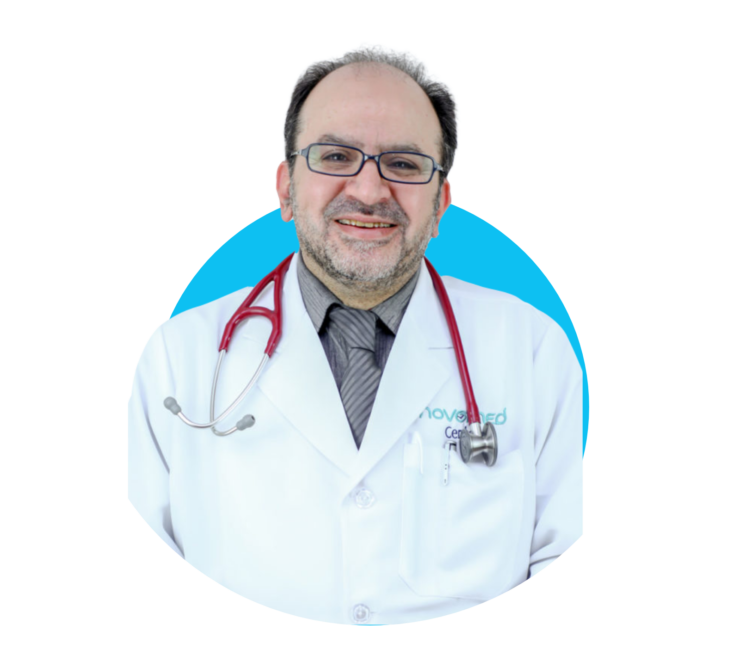Thyroid Treatment in Dubai, Abu Dhabi and Al Ain
Overview
The thyroid gland is located at the base of your neck and produces hormones that balance your body metabolism and ensure its prober growth and development.
Thyroid disorders occur when the thyroid gland produces an abnormal amount of hormone, and they are classified into two types: hyperthyroidism, when there is an excess of thyroid hormone, and hypothyroidism which occurs when there is a lack of hormone production.
Thyroid disorders can range from mild cases (such as a goiter, which is the irregular enlargement of thyroid gland) to severe cases (such as thyroid cancer). These disorders require medical help to be effectively managed and treated.
What are the symptoms of thyroid disorders?
Hyperthyroidism can cause the following symptoms:
- Anxiety or irritability
- Fatigue and weight loss
- Sleeping problems
- Tremors and physical weakness
- Sweating and heat intolerance
Hypothyroidism can cause the following symptoms:
- Depression
- Fatigue and weight gain
- Memory or concentration problems
- Cold intolerance
- Muscle and joint aches
What causes thyroid disorders?
Factors that can cause hyperthyroidism include:
- Graves’ disease. This disease is caused by an overactive thyroid gland with excessive thyroid hormone production.
- Thyroid nodules. Nodules can form in the thyroid gland and leak thyroid hormones. In rare cases, thyroid nodules can become cancerous after several years if left untreated.
- Subacute thyroiditis. This condition is characterized by an inflammation of the thyroid gland that causes it to leak stored hormones.
- Excess iodine. When your body has too much iodine, the thyroid produces more thyroid hormones than it requires.
Factors that can cause hypothyroidism include:
- Hashimoto’s thyroiditis. It is an inherited condition in which the body’s cells attack and kill the thyroid tissue, preventing it from generating hormones.
- Excessive iodide exposure. Certain cold and sinus medications may expose you to too much iodine and put you at risk of having hypothyroidism.
- Iodine deficiency. The thyroid requires iodine to make hormones. Hypothyroidism due to iodine deficiency is a problem that affects millions of people.
- Thyroid gland dysfunction. A condition that affects newborns in which the thyroid gland does not function properly.
How are thyroid disorders diagnosed?
During the consultation, our endocrinologist will review your medical history, ask about your symptoms, examine your neck and request blood tests to measure the level of thyroid hormones in your blood.
The doctor may also order a thyroid scan or perform a fine needle aspiration, which involves taking a sample of cells from the thyroid with a long needle to be sent to a lab for analysis.
How are thyroid disorders treated?
The endocrinologist will determine the type of treatment that will help regulate your thyroid hormone levels depending on the type of thyroid disorder you have.
Treatment options for hyperthyroidism include:
- Antithyroid medications to prevent your thyroid from producing hormones.
- Beta-blockers to help manage the symptoms.
- Radioactive iodine. This treatment damages your thyroid’s cells, which stops it from producing an excess of thyroid hormones.
- Thyroidectomy. which involves the surgical removal of thyroid gland to prevent further hormones production . Recovery after surgery takes two weeks, and you will have to take synthetic thyroid hormone for the rest of your life.
Treatment options for hypothyroidism include:
- Thyroid hormone replacement medicines to replace the hormones that your thyroid can no longer produce. This treatment can help increase thyroid hormone levels and alleviate symptoms.
- Iodine. Taking small doses of iodine is effective if you are experiencing iodine deficiency.
Schedule your appointment at Novomed today!
If you are suffering from a thyroid disorder, make an appointment with one of our expert endocrinologists in Dubai or Al Ain to learn more about your condition and treatment options.
Book your consultation today by calling toll-free 8006686 or clicking the live chat icon at the bottom of the screen.


